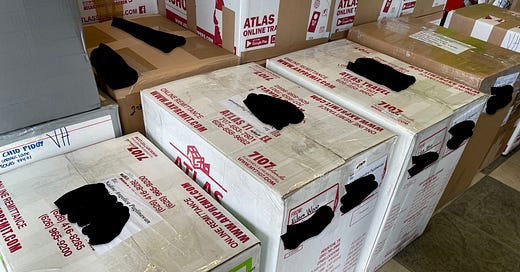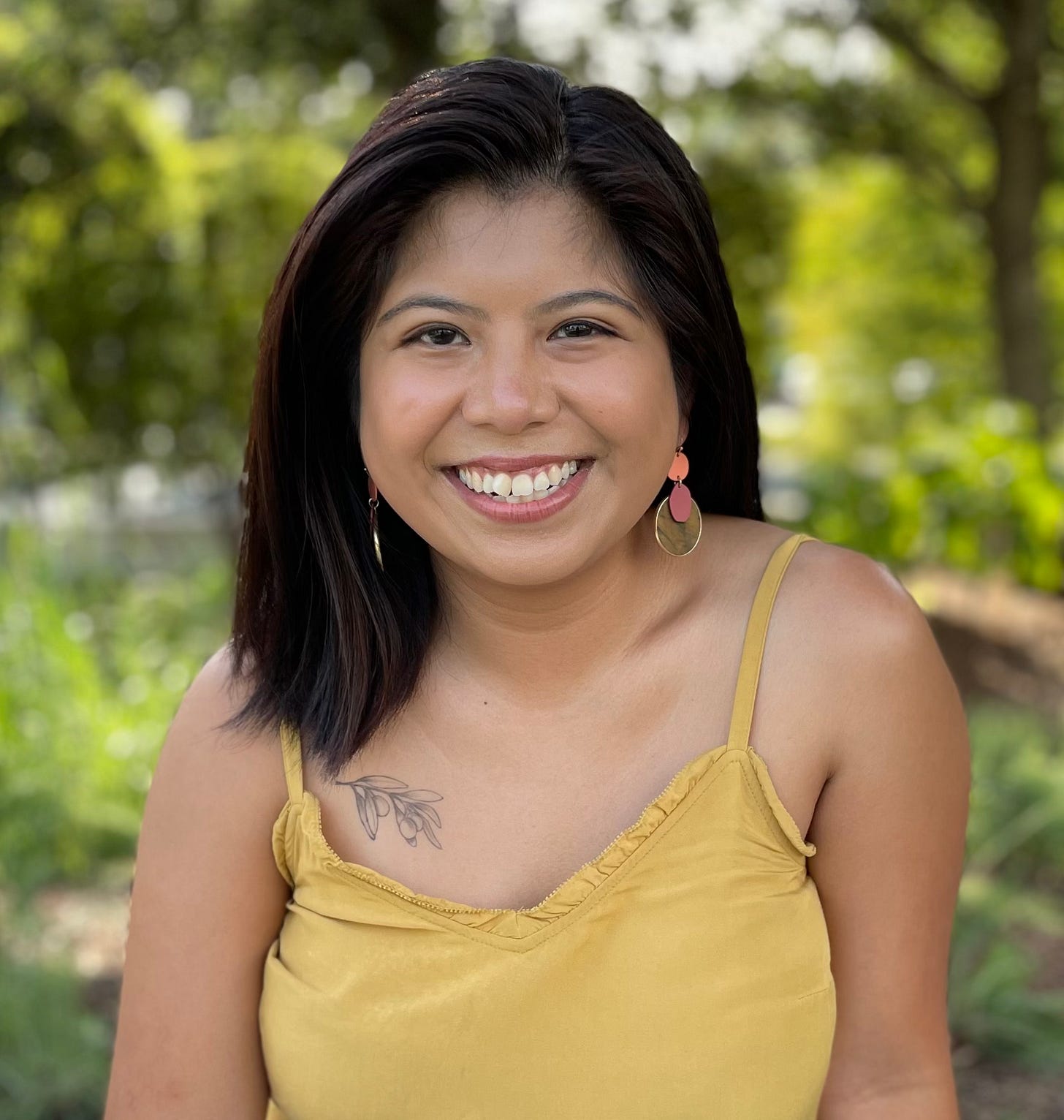The Gift of Kapwa
Fatima, Diaspora Network's Program Associate, meditates on a Filipino tradition and core value, and how it points to the Gospel
One of my early memories of Christmastime involves opening a balikbayan box. It came from Texas from our Tita Eileen, our birth mom’s younger sister — who would later become our adoptive mom. My older sister and I still lived in the Philippines with our Mama (Eden), our younger brother (Amiel), and the rest of our extended family and relatives. This was before the reality of adoption had sunk in, before encountering the late December chill of my first American winter, and before learning that Texas did not in fact usually see snow, despite what the television commercials showed us.
This Christmas involved hovering excitedly around Mama and my uncles as they carefully cut through the shipping tape that was painstakingly wrapped around the precious brown cargo box that bulged with the sheer volume of its treasures. Upon opening the box, there were the customary shouts of excitement: oohing and aahing over exotic American candies like Hershey’s Kisses and packages of M&Ms (for the younger kids); gently-worn garments and shoes (for the older cousins and adults); and precious commodities like bars of Dove soap, scented candles, over-the-counter pain medication, and non-perishable foods. Loose items were carefully bound together with painter’s tape and names were printed neatly to designate what went to who.
I don’t remember the precise words that were said. Nor was I particularly attentive at that age. I’m sure I was too busy bickering with my siblings about how to best divvy up the chocolate. But I do remember the prevailing sentiment that settled around us like a comforting blanket: these pasalubong (the English equivalent of “souvenirs,” but more literally translated as “something meant for you when you welcome me back”) were tangible symbols of care from Tita Eileen. Though she couldn’t physically be with us, she missed us, thought of us, and longed to be with us. She sought to show her love for her family and homeland, even while living as an immigrant millions of miles away.1
To many, the balikbayan box is one of the most enduring symbols of the Filipino diaspora. “Balik” means “to return” and “bayan” refers to one’s hometown or in this case, homeland. The term was coined by the Marcos regime in the 1970s.2 Ferdinand Marcos, Sr., the former-president-turned-dictator, was concerned about the brain drain the Philippines was experiencing. More highly educated or upwardly mobile Filipinos were leaving the country to find jobs overseas in order to escape their homeland’s political corruption and economic instability. These Overseas Filipino Workers (OFWs), who worked in everything from nursing, to construction projects and caretaking, were encouraged to return to their homelands by offering lower airfare, increasing tax incentives, and easing restrictions around customs.3 The Marcos government, through the Balikbayan Program, urged OFWs to return to visit loved ones, however briefly, and encouraged them to spend (or send) the money they had earned overseas to help bolster the faltering Philippine economy.4
By the 1980s, OFWs were already regularly wiring money to their families back home. The budding business of shipping care packages back home exploded into a profitable industry that was very quickly codified into Philippine law. By the time Marcos and his ilk had been ousted and replaced by then-President Corazon Aquino, balikbayan boxes were afforded duty- and tax-free status in recognition of the labor performed and foreign revenue earned by OFWs.
But government policies notwithstanding, the balikbayan box is also emblematic of a beautiful value that is core to Filipino identity: that of kapwa.
Even writing that word stirs up great emotion in me—pride and gratitude in being born Filipino, and in the comforting knowledge that I am cradled within a broad kinship network that traverses space and timezones. I am suffused with warmth when I remember that I share an affinity for, and history with, the Philippines’ many rich cultures that prize communal interdependence.
Kapwa is an indigenous word, one that has endured Spanish and American colonialism. While its environ has evolved somewhat, it is still woven into the fabric of 21st century Filipino identity. To Professor Virgilio Enriquez — the founder of Filipino psychology — kapwa is “a recognition of a shared identity, an inner self, shared with others.” Professor Enriquez calls it a way of “practicing peace,” where kapwa is radically inclusive and recognizes a shared “moral obligation to treat one another as equal fellow human beings.”
Psychologist BJ Gonzalvo, a follower of Jesus, believes that it is “one of the Filipino culture’s profound offerings to humanity.” He goes on to say this:
“From my perspective as a Filipino in the diaspora, Kapwa is our inheritance, a gift to the Filipino people, and in turn, a gift that the Filipinos share with the world and with all of humanity, our kapwa tao. It is a gift that keeps on giving, for kapwa is our lens through which we are able to glimpse the infinite beauty of the Divine image, the image of Christ in the other.”
To truly live out kapwa as a guiding principle is very often sacrificial and time consuming. It requires the kind of unbounded generosity that slices neatly through my learned Westernized individualism. Kapwa calls me to value and honor the Other over myself, to remember that “no man is an island.” Kapwa answers Cain’s question — “am I my brother’s keeper?” — with a firm and resounding yes.
I’ve seen kapwa lived out in various ways over the years, from both Filipinos and non-Filipinos alike. These were the people who watched me move from elementary to middle school to high school, who helped my sister and I move into our respective college dorm rooms, who attended our graduations and graduation parties, and helped me move into my first post-grad house. These were the people who helped me move to grad school, and (a couple of years later) attended my wedding, making it a joyful marriage of Filipino and White American cultures. Kapwa was what I struggled to convey when friends asked me over the years: “how do you have such a big family when they’re not even related to you?”
Yes, kapwa can be twisted into ugly and sinful ends. Communal cultures are notorious for the honor/shame binary and how it is perpetuated generationally. Perhaps in a future post, I can reflect more on how the gift of kapwa can be bitterly twisted into a weed that chokes out the fruit of life-giving mutuality.
And yet, I cannot seem to give up on it, no matter how ugly I have seen it turn out. In a recent assignment for the Diaspora Network’s Next Gen Cohort, members were asked to reflect on the beautiful things that our ethnic identities offer. I immediately thought of kapwa, and though I flinched because I too have been grievously wounded by its weaponization, I suddenly became aware of how the Lord Jesus would redeem a value so essential to my people’s culture. How could He not? Jesus exists in perfect, peaceful, mutuality with the two other persons of the Trinity. The Father, Son, and Holy Spirit exist in glorious kapwa and we, the Imago Dei, are joyfully invited to partake in this love and reflect this peace back to others.
Jesus shares His very Self with us. Colossians 3:1 says “Since then we have been raised with Christ, seek the things that are above, where Christ is, seated at the right hand of God.” [emphasis my own] We are with Christ. The Spirit indwells in us. Ephesians 2:13-16 even goes so far as to say this:
“For [Christ] is our peace, who made both groups one and tore down the dividing wall of hostility. [...] He did this so that he might reconcile both to God in one body through the cross by which he put the hostility to death.”
Because of what Jesus did, we now share in who He is. We are also told to “outdo one another in showing honor” (Romans 12:10). We are now reconciled to God and until He returns, we can, by the power of the Spirit, live in kapwa by recognizing and rejoicing in our shared humanity. Because of Christ, we are now also kababayan, or fellow citizens, of an ever-nearing heavenly kingdom. And through this profound value that Filipinos offer to the world, we are invited to “glimpse the infinite beauty of the Divine image, the image of Christ in the other.”
Yes, He will return and make all things new. Grief and death — and manipulation and shame — will be no more. Yet even on this side of eternity, I see the Lord redeeming kapwa. At Diaspora Network, we recognize that our immigrant brothers and sisters are themselves gifts and blessings to both their homeland and to the Church in North America. We celebrate the spirit of kapwa and the ways we see it lived out week after week in so many immigrant churches and homes. And we seek to name the gifts, like precious pasalubong inside balikbayan boxes, that each unique community brings to the Church.
I came across this article while writing and it captures something of the “loving inconvenience” I’ve come to associate with packing & shipping one of these behemoth boxes.
Shyong, Frank. “These Boxes Are a Billion-Dollar Industry of Homesickness for Filipinos Overseas.” Los Angeles Times, April 28, 2018, sec. Must Reads. https://www.latimes.com/local/lanow/la-me-balikbayan-boxes-20180428-htmlstory.html.
Tardiff, Sara. “The Beloved Filipino Tradition That Started as a Government Policy.” The Atlantic, December 24, 2021. https://www.theatlantic.com/culture/archive/2021/12/christmas-tradition-keeps-my-grandmothers-memory-alive/621135/.
Pido, Eric J. “Balikbayan.” In Asian American Society: An Encyclopedia, edited by Anthony Christian Ocampo and Mary Yu Danico, 137–39. Los Angeles, California: SAGE Publications, 2014.
Alonzo, Jose Gabriel. “The Balikbayan Program and Labour Export Policy: The Socioeconomic Relationship Between The Philippine State and Filipino Diaspora.” University of Guelph, 2022.
Fatima Glass is the Program Associate for the Diaspora Network. She was born in Marikina, Philippines and lived there until she and her older sister were adopted by their maternal aunt and uncle and brought to Fort Worth, Texas. Her birth mom, two younger brothers, and most of her family still live in the Philippines. Fatima currently resides in Austin, Texas with her husband, Benjamin.






